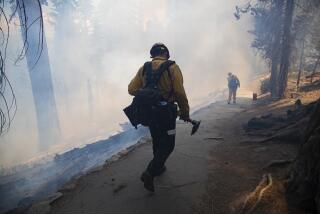Global Warming Action Seen Not Urgent : Environment: Researchers say that measures can be delayed for 10 years without significant adverse effects. They caution against inaction, however.
Measures to combat global warming can be delayed for 10 years without significantly affecting future worldwide temperatures, according to a new study published in Nature today.
The study, by scientists at the University of Illinois at Urbana-Champaign, is likely to strengthen attempts by the Bush Administration to postpone potentially costly measures to reduce carbon dioxide and other greenhouse gases.
If nothing is done for 10 years, temperatures will rise only slightly more than they otherwise would have by the year 2100, the report said.
The authors, however, cautioned against inaction.
âThe study of the greenhouse effect, both theoretically and observationally, should be accelerated into a crash program so that we do not squander the time that nature has given us,â they wrote.
The finding was based on calculations that tried to predict the futureâs climate by taking into account the last 120 years of temperatures. There is a lag of 50 to 100 years before temperatures rise in response to greenhouse emissions.
At least 20 industrialized nations have called for steps to reduce or stabilize gases that contribute to global warming. The United States, however, has resisted setting targets for cutbacks as urged by environmentalists. Such cutbacks could require huge reductions in energy use.
Not surprisingly, environmental groups criticized the Nature study, saying delays would lead to more costly measures in the future. Sen. Al Gore (D-Tenn), a proponent of strong measures to head off warming, released a statement saying the world can not afford to wait.
But Micheal E. Schlesinger, a co-author of the study and of a previous United Nations report on climate change, said the insignificance of the temperature change--a difference of less than 5% of what it would be if steps were taken immediately--justifies postponing major action until scientists better understand the sensitivity of the climate to greenhouse gases.
For instance, he notes, predictions of temperature increases in the next century range from minor to catastrophic.
Schlesinger cited a previous study that indicated the United States might have to reduce carbon dioxide emissions to 18th-Century levels to stabilize levels in 2030. Carbon dioxide is produced by the burning of fossil fuels, such as oil and coal.
âYou donât want to move in that direction until you have fairly good evidence that it is the direction you have to move in . . .â he said Wednesday. âIf you want to protect your family, you are going to buy life insurance, but you are not going to buy 10 times more than you need.â
Schlesinger said his calculations are good news because they show there is enough âleeway to to do further scientific study to narrow down the uncertainty.â
The professor, who conducted the study with graduate researcher Xingian Jiang, said it provides a case for a phased approach to reducing emissions, not an argument for doing nothing. âIf we squander the time we have, then it will be too late,â he said.
An Administration source who asked not to be identified said the study appeared to justify President Bushâs go-slow approach and would bolster the Administrationâs stance. The source, however, said Bush does not believe that measures to reduce global warming can be put off indefinitely.
Ralph Cicerone, an atmospheric chemist at UC Irvine, said Schlesinger was attempting to âplay it straightâ by allowing for the fact that future temperature hikes could be smaller than previously believed.
âSchlesinger is a good scientist, and he is fully aware that playing with (climate) models . . . is dangerous,â Cicerone said. âI think he felt that in a subject as complicated as climate prediction, we have to use every piece of data available.â
Cicerone noted, however, that Schlesinger wrote the report before a more recent study by scientists in Stockholm and Seattle indicated that air pollution from sulfur emissions may have prevented the Northern Hemisphere from warming even more during this century. That study suggests that global warming may be an even greater threat than previously believed because the Earth will warm more as steps to reduce air pollution take effect.
Schlesinger said he is âliterally working night and dayâ on a new study that will take into account the âpartially nullifyingâ effect of sulfates on global warming.
Six of the warmest years since 1850 have occurred during the last decade, with temperatures last year the warmest on record. Some scientists have estimated that temperatures could rise by as much as 9 degrees Fahrenheit over the next century if nothing is done to curtail greenhouse gases. That would be catastrophic, comparable to the temperature increase since the last Ice Age.
John Firor, director of advanced studies at the National Center for Atmospheric Research in Boulder, Colo., said waiting a decade to reduce emissions would be a major political mistake.
âThe sooner we get busy trying to slow down our emissions the better we are,â he said. âIt is going to take decades to get people organized to reduce emissions. To say we can wait a decade before we start may be a perfectly sound calculation, but it is not a good political calculation.â







